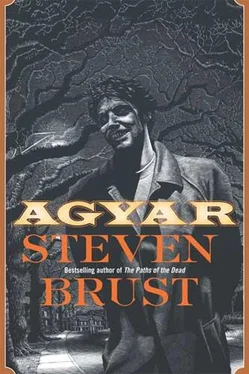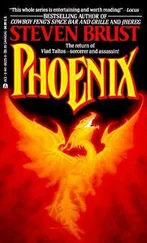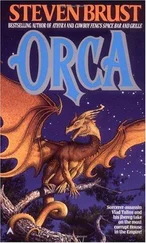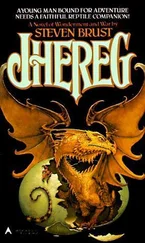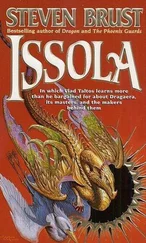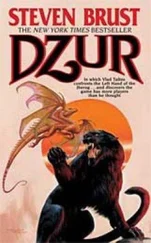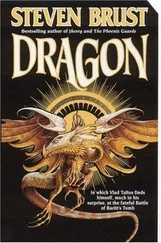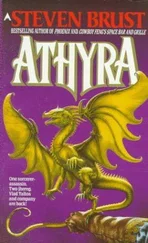Steven Brust - Agyar
Здесь есть возможность читать онлайн «Steven Brust - Agyar» весь текст электронной книги совершенно бесплатно (целиком полную версию без сокращений). В некоторых случаях можно слушать аудио, скачать через торрент в формате fb2 и присутствует краткое содержание. Жанр: sf_fantasy_city, на английском языке. Описание произведения, (предисловие) а так же отзывы посетителей доступны на портале библиотеки ЛибКат.
- Название:Agyar
- Автор:
- Жанр:
- Год:неизвестен
- ISBN:нет данных
- Рейтинг книги:3 / 5. Голосов: 1
-
Избранное:Добавить в избранное
- Отзывы:
-
Ваша оценка:
- 60
- 1
- 2
- 3
- 4
- 5
Agyar: краткое содержание, описание и аннотация
Предлагаем к чтению аннотацию, описание, краткое содержание или предисловие (зависит от того, что написал сам автор книги «Agyar»). Если вы не нашли необходимую информацию о книге — напишите в комментариях, мы постараемся отыскать её.
Agyar — читать онлайн бесплатно полную книгу (весь текст) целиком
Ниже представлен текст книги, разбитый по страницам. Система сохранения места последней прочитанной страницы, позволяет с удобством читать онлайн бесплатно книгу «Agyar», без необходимости каждый раз заново искать на чём Вы остановились. Поставьте закладку, и сможете в любой момент перейти на страницу, на которой закончили чтение.
Интервал:
Закладка:
Jim was looking at me and waiting for an answer as all of this went through my mind, so I said, “I don’t know, maybe she did at one time. But it doesn’t matter.”
“I guess I just don’t understand,” he said.
“I guess you just don’t,” I told him, which ended the conversation.
I’m feeling sort of lazy, so I probably won’t go out any more today, unless this machine inspires me the way it did before. Thinking back, that’s still a little strange.
There are a few boxes of books in the attic, and I spent some time digging through them. Old boxes of other people’s books are always interesting, even if the books themselves aren’t, and here there were a few that caught my eye, such as a 1933 edition of the Encyclopedia Britannica that I looked at for a while. It seemed to specialize in world history, and I was surprised at how much they got right. I also found ten volumes of “Great Orations,” published in 1899. They were in much worse shape than the encyclopedias, but I allowed myself the luxury of a couple of hours with them.
There were plenty of newer books, too, but I feel about books much the way I feel about music; if it’s still being printed in fifty years, I’ll read it then. If, of course, I’m still around in fifty years, but there’s no point in dwelling on that. I’d rather remember Zola’s speech to the jury on the Dreyfus case, which I found in Volume 10. I don’t know who recorded that speech for history, but he ought to be thanked.
Certainly, there’s a good deal of nonsense in it. “Who suffers for truth and justice becomes august and sacred.” Indeed? I remember laughing aloud the first time I read that, and wishing I’d been there when he said it just so I could have looked at his face and seen if he believed it. But there is some truth in his speech that goes far beyond the case of the moment, and his love for his military, and his worship of that stupid country full of stupid Frenchmen. “For when folly and lies are thus sown broadcast, you necessarily reap insanity,” he said, and what man who has lived for more than forty years has not seen that truth?
“We have had to fight step by step against an extraordinarily obstinate desire for darkness.” Yes, indeed, Emile, we have; or, rather, you have, you and your ilk. That is certainly not my fight, nor will it ever be, but I can applaud yours, and even, to my surprise, discover a couple of tears for the way it has been fought. And, do you know, sometimes I even think that some ground has been gained. But then I read, in Volume 6, Robert Emmet’s speech from the scaffold, and I remember that Great Britain has banned songs that might even hint that all is not well in Northern Ireland, and I see that darkness is reclaiming its own.
But, as I said, this has never been my fight, and never will be. Darkness, I think, has its own charm, as long as one can see well enough to avoid tripping over the furniture. As for me, my only desire is the quite natural one to live; to continue my chain of existence. And even that doesn’t matter much to me. That is a strange thing to say, but it has been going through my head since Jim brought it up, and it seems to me that I continue to exist, and I enjoy it, but should the end come, as it might soon, I will meet it with a shrug. This is no great virtue, nor any great flaw, it is simply my nature, and what man can contend with his nature?
But there, too-this is a strength. Zola and Emmet notwithstanding, strength does not come from passion for justice, it comes from not caring-about life, about justice, or what have you. If you are able to face an enemy, and not care what he does to you, then he cannot really hurt you. If you are able to say to a lover, “Do this or I’ll leave you,” and your lover wants you to stay, then you have power; it’s that simple. If you are able to say to the judge, “Kill me if you want, I don’t care,” and the judge doesn’t want to kill you, then you have the power. Now, it may be that the lover wants to leave you, and the judge probably does want to kill you, but if you can say, “I don’t care,” that is a strength they cannot take away.
Of course, you must mean it.
I seem to have reached a state where I can say these things and mean them, and it is this power that I enjoy. That is why I don’t fear what Kellem may do. Certainly, I cannot escape her, in this she has the power. But because that doesn’t matter to me, because I don’t care if I live or die, she cannot really hurt me.
No one can hurt me.
But I can still shed a few tears for Emile Zola.
Another day gone by. The weather has turned very cold, and the lack of heating in the house (the thermostat is set just barely high enough to keep the pipes from freezing) is becoming annoying. I have the choice of sitting in front of the fireplace or here at the typewriter. My fingers are actually cold enough to interfere with my typing, at least a little. It just occurred to me that I could bring this machine down to the parlor, but I don’t think I want to. And there’s a limit to how often we ought to have a fire; the house is known to be deserted, and I’d hate to have someone come by to investigate why smoke is coming from the chimney.
I’m feeling well just now-very well. I stopped by to visit Jill, but she was flat on her back with, she said, some sort of virus. She warned me not to come too close or I’d be likely to catch it. I took the chance of giving her a quick peck on the forehead, which felt warm but not feverish, then went downstairs.
Susan was wearing a plain black ankle-length skirt that tied at the waist and a white T-shirt that didn’t advertise anything. She was stretched out on the couch, her feet up on some cushions, reading a magazine called Z. She pivoted her neck backward so she was looking at me upside down and said, “I didn’t hear you come in.”
“I was checking on Jill. She’s sick.”
“Yes, I know.” She sat up and twisted around in one motion.
“It’s a little cold outside,” I said, “but we can call a cab, if you wish.”
“You want to go out?”
“We might.”
“We could order a pizza.”
“None for me; I’d just been thinking coffee.”
“If that’s all, shall I put some on? I have Kona.”
“Good idea, and you can order a pizza for yourself. I’ll watch you eat it and make helpful suggestions.”
I studied her walk as she went back into the kitchen. She turned her head and gave me a big smile. Presently there was the sound of a coffee grinder. I looked through her record collection. She seemed to be a holdout, judging from the lack of CDs. But records are more fun to look through anyway. There seemed to be no logic to the arrangement, with Mozart stuck between The Clash and Kate Bush and so on, but the real surprise was the number of musicals; a quick glance showed me Oklahoma! The Music Man, West Side Story, and South Pacific. Interesting.
Coffee smells began to permeate the room. I put on a collection of Scott Joplin rags. There is something indefinable about Joplin that reminds me of the tunes I used to hear the fiddlers play back in the proverbial Old Country. I’m not sure what it is, but when the sounds of the upright piano filled the room, I felt it.
“Feel free to put something on the stereo,” she called.
“Thanks, I will.”
She waltzed back, twirled twice, bent backward with one arm curled over her head, straightened, bent forward, picked up the telephone, pushed buttons from memory, and ordered a small pizza with pepperoni, onions, and mushrooms. She spoke on the telephone as if ordering this pizza was one of the most exciting things she had ever done.
As she was hanging up, the door opened, and a very young looking couple, both wearing old ankle-length coats, scarves, and stocking caps, came in, accompanied by a trace of cold air in spite of the entryway door. They looked at me, I looked back. Susan introduced them as the mysterious tenants of the attic as they took off their winter garb and set things on pegs in the entryway. Neither of them commented on my bobby’s coat. She was a little taller than he was, had mousy brown hair and a rounded face with tiny blue eyes. He looked like a New York Jew, with long, curly dark hair, faintly Semitic features and brown eyes. Her name was Melissa and his was Tom. They looked and acted burned out. I smelled stale marijuana smoke on their clothes (her T-shirt said Hard Rock Cafe, Chicago, his said Pink Floyd), but that proved nothing; it’s possible to burn out on marijuana, but it takes dedication. Susan told them my name and it looked as if it had passed through her head, into his, and then fallen to the floor; I’d have been willing to bet money that if I had asked them what it was right then neither would have known.
Читать дальшеИнтервал:
Закладка:
Похожие книги на «Agyar»
Представляем Вашему вниманию похожие книги на «Agyar» списком для выбора. Мы отобрали схожую по названию и смыслу литературу в надежде предоставить читателям больше вариантов отыскать новые, интересные, ещё непрочитанные произведения.
Обсуждение, отзывы о книге «Agyar» и просто собственные мнения читателей. Оставьте ваши комментарии, напишите, что Вы думаете о произведении, его смысле или главных героях. Укажите что конкретно понравилось, а что нет, и почему Вы так считаете.
